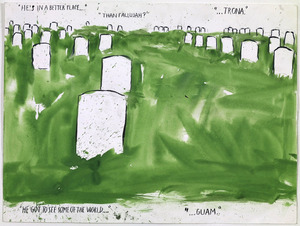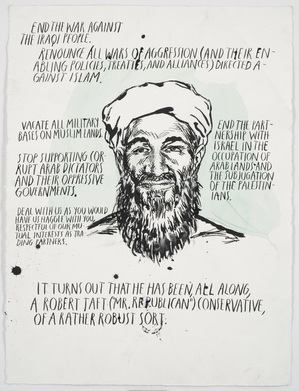This is an archive of the ArtCat Zine, 2007-2009. Please visit our new project, IDIOM.
Fuck You, Ray. Here's YOUR Irony Back (The Really Big Picture)

and gouache on paper, 18 x 24 inches.
Courtesy of David Zwirner.
Raymond Pettibon
David Zwirmer - 519 W. 19th St. New York, NY
11 September - 20 October 2007
Raymond Pettibon is one of the first artists I have ever loved and the only contemporary artist I have known about since high school. In the context of SST Records, he helped me arrange my first relationships to power. My own seething over Grenada. Iran-Contragate. Reaganomics. I don't care that Pettibon doesn't like to discuss that part of his career anymore — I can't think about him without vividly remembering the summer I spent watching Oliver North and Fawn Hall take the stand on C-Span in my friend Mark's crappy little studio apartment, my head shaved and finally a set of car keys in my pocket, a Black Flag album cover in my lap. My fists and jaw were probably clenched.
I love Raymond Pettibon because he understands the existential weight of having to take it all in. Everything from the comic-book format to the way his individual drawing refuses to turn into anything more than a scrap of inky paper confirms that he is not special, not a genius. He is just someone who watches the world, and the world makes him sad and mad and desperate. This sadness and desparation — punctuated by occasional glimmers of hope reflected in the lonely soul of the individual — is meaningful. And it's totally punk rock. Still. The message in Here's Your Irony Back (The Big Picture) is the same as the overwhelming lesson of the eighties, of Jello Biafra and Henry Rollins. You can see exactly what these fucks in power are doing. And you can do more than talk about it. You can scream your fucking head off about it. You can get really angry. You can put safety pins all over your face and your pants and you can dance powerfully and tribally about it until you are a drunken, soggy heap, and you will be beautiful and meaningful. You will, in that moment of total writhing expression, make perfect sense in relationship to the rest of the world.
But you will not make a difference.
In Pettibon's art, that sense of futility is the sweet spot. It's in the gesture of reaching for a little bit of literature to understand today and winding up at enigma. It's in the quantity of drawings and the quantity of ink. It's what makes his earlier work incredibly interesting in terms of power, even though it lacks much specific political content. And it is what makes the current show at Zwirner, which is chockablock with Bush Administration imagery, more than propaganda. It's not about what Bush is doing and what we should think about that as much as it's about how watching Bush represent us makes us feel. Pettibon has mastered that expression, and here as always it is dirty, overinked and totally wrought. And here as always, it is as insignificant as it is powerful. A scrawl on a wall. A guy with a pad of paper and a lot of fucking ink. A show that you could wad up into a trash bag and paint over in no time.

and gouache on paper, 30 x 22 1/2 inches.
Courtesy of David Zwirner.
And herein lies the problem: both with Pettibon's latest effort and punk rock in general — especially right now. It may make very deep sense that the beauty of that individual expression of desperation may be totally narcotic. But in order for it to do that voodoo that it does so well, punk rock depends upon a steady supply of evildoers to rally against.
I have been writing and deleting this next part for awhile. Every time I continue my thought, it comes out something like this:
"The evildoers have caught on to this symbiosis, and understand that Pettibon has a role to play in distracting us from our own role in what they are doing."
But that sounds needlessly like a conspiracy; as if Cheney (or whoever is filling Rove’s shoes these days) called Pettibon and said, "Ray: about your show at Zwirner? What we need to do is make everyone who’s rich or even remotely intellectually powerful think that they are doing something countercultural, but we don't want any actual revolutions happening here — it's not like we were exactly elected, you know, and we need to be careful. So if you could just make some drawings that made people feel how evil we are, and how futile it is to resist us, that would be great. In fact, it would be better if you could put them in a blue-chip gallery and not in a 'zine, so you won't inspire any other DIY self-expression, but keep it purely on the commodity level."
And that, of course, is silliness. While Bush and Cheney do fundamentally understand that people can oppose them all day and it doesn’t matter because they never back it up — that does not make Raymond Pettibon the next incarnation of Leni Riefenstahl.
But the thing is, that he doesn't need to be Leni in order for him to help me be a Good German. To give in to that beautiful sensation of individual futility is to abandon any number of possible actions and believe that the intellectual work is complete, because one has opposed that which needed opposing. It is to wash one's hands when there is heavy lifting left unfinished! Art cannot accomplish the act of overthrowing the motherfuckers in the White House. But it can inspire the act, envision the possibility, even define a viewership’s relation to power. Punk did this and Pettibon helped. But by limiting outrage and action to the sphere of individual expression and romanticizing futility, they have created a “counterculture” that the empire has actually come to rely on. I do not doubt that this show is a sellout, and that the buyers feel vindicated because of their purchases. But right now, when it seems the entire op-ed staff of the New York Times is straightforwardly begging the American people to do more, it seems like a good time to stop luxuriating in this futility.
ZINE
HOME
TIPS / COMMENTS
CATEGORIES
CONTRIBUTORS
- Greg Afinogenov
- B. Blagojevic
- Adda Birnir
- Susannah Edelbaum
- Julie Fishkin
- Paddy Johnson
- Jessica Loudis
- Christopher Reiger
- Andrew Robinson
- Peter J. Russo
- Blythe Sheldon
- S.C.Squibb
- Hrag Vartanian
